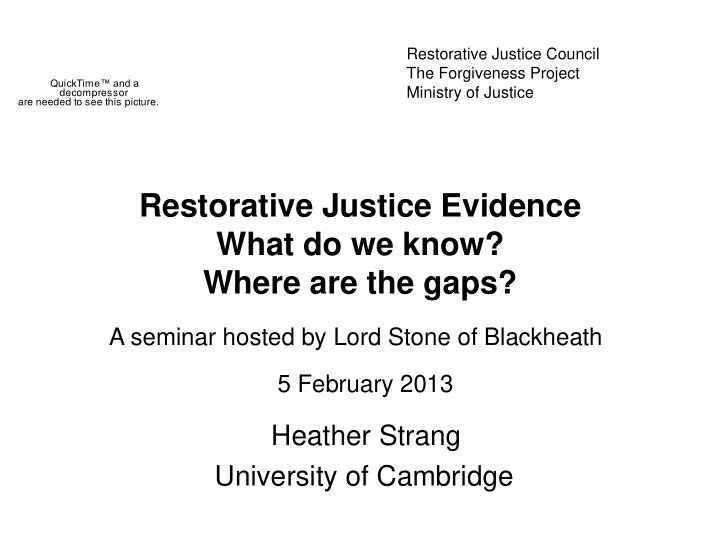

Restorative Justice Council The Forgiveness Project QuickTime™ and a Ministry of Justice decompressor are needed to see this picture. Restorative Justice Evidence What do we know? Where are the gaps? A seminar hosted by Lord Stone of Blackheath 5 February 2013 Heather Strang University of Cambridge
What we know already A good deal about face-to-face RJC: – About victims - very positive for those choosing to take part – About offenders - more complicated • Different offences (serious/violent vs trivial) • Different offenders (adult vs juveniles) • Different points in the justice system (‘in addition’ vs ‘instead of’ normal cj processing) • Procedural justice as well as reoffending outcomes – About costs (Shapland et al evaluation) • Across total costs of crime - 8:1 • Across cj costs only - 2:1
What kind of RJ is happening in UK? • Programmes springing up all over – Many police-led (Community Resolutions etc) – Mostly for juveniles – Mostly trivial offences – Mostly explicitly to save money • Evidence-based? – Little attention to research findings – Little programme evaluation (with honourable exceptions - West Midlands Police and TV Police)
Where are the research gaps? • Evaluations of programmes already in place • RJ for specific offenders (e.g. ethnic minorities) • RJ for specific offences (domestic abuse, sexual offences) • Long-term effects of RJ
Methodologies for specific research gaps • Depends what you want to achieve • To find out whether one ‘treatment’ works better than another – Nothing beats a randomised controlled trial – ‘Level 3’ experiments - before/after measures with a treatment and a comparison group - can provide useful findings • Anything less often as time-consuming and expensive as an RCT (esp when you add the cost of a useless programme)
Methodologies (continued): for programmes already in place • To find out how well a programme is running - process evaluation (monitoring and observation) • Essential step prior to outcome evaluation • To gauge participant satisfaction and other attitudes - interviews (but beware response rates) • Need to ‘build in’ evaluation measures with programme development - so reliable data available to evaluators
Evaluating RJ with sensitive populations • First develop the programme (experience with RISE and consequent role with JRC research) • Some research already available in domestic abuse and sex offences (US, Canada, UK, NZ, Australia) • a little available on ethnic minority offenders • Growing recognition that RJ may have a role for these offences • Some preliminary data on effectiveness may be obtainable by methods less rigorous than RCT - but how useful? how reliable?
Methodologies (continued) • To assess long-term effects – Follow-up interviews – Need for high quality contact information – Well trained (and persistent) interviewers – A questionnaire that focuses on the crime, its aftermath,the justice experience, life events (esp how RJ/not RJ affected their lives) – Evidence so far shows that effects could not have been predicted (RISE victims/offenders c.f. Indianapolis)
Recommend
More recommend